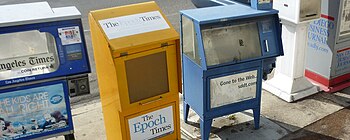
I remind students that reading and composing are acts that reflect our biases. There is a long essay in the New York Times supporting my thesis. I have included two of the pertinent paragraphs.
Bad News
The New York Times
July 31, 2005
By RICHARD A. POSNERThe argument that competition increases polarization assumes that liberals want to read liberal newspapers and conservatives conservative ones. Natural as that assumption is, it conflicts with one of the points on which left and right agree – that people consume news and opinion in order to become well informed about public issues. Were this true, liberals would read conservative newspapers, and conservatives liberal newspapers, just as scientists test their hypotheses by confronting them with data that may refute them. But that is not how ordinary people (or, for that matter, scientists) approach political and social issues. The issues are too numerous, uncertain and complex, and the benefit to an individual of becoming well informed about them too slight, to invite sustained, disinterested attention. Moreover, people don’t like being in a state of doubt, so they look for information that will support rather than undermine their existing beliefs. They’re also uncomfortable seeing their beliefs challenged on issues that are bound up with their economic welfare, physical safety or religious and moral views.
So why do people consume news and opinion? In part it is to learn of facts that bear directly and immediately on their lives – hence the greater attention paid to local than to national and international news. They also want to be entertained, and they find scandals, violence, crime, the foibles of celebrities and the antics of the powerful all mightily entertaining. And they want to be confirmed in their beliefs by seeing them echoed and elaborated by more articulate, authoritative and prestigious voices. So they accept, and many relish, a partisan press. Forty-three percent of the respondents in the poll by the Annenberg Public Policy Center thought it “a good thing if some news organizations have a decidedly political point of view in their coverage of the news.”
Research also reveals that local media tend to reflect local values. A major newspaper in an urban area survives because people are willing to subscribe. That suggests the people agree with the newspaper, and the newspaper agrees with its readers. The argument that media lead voters simply is not reflected in the waning value of endorsements, for example. No, media follow audiences, even the non-profit media.
We need to ask ourselves (and encourage our students to ask) what we read and why. How do our reading and viewing habits reflect us? Are we part of an echo chamber?
